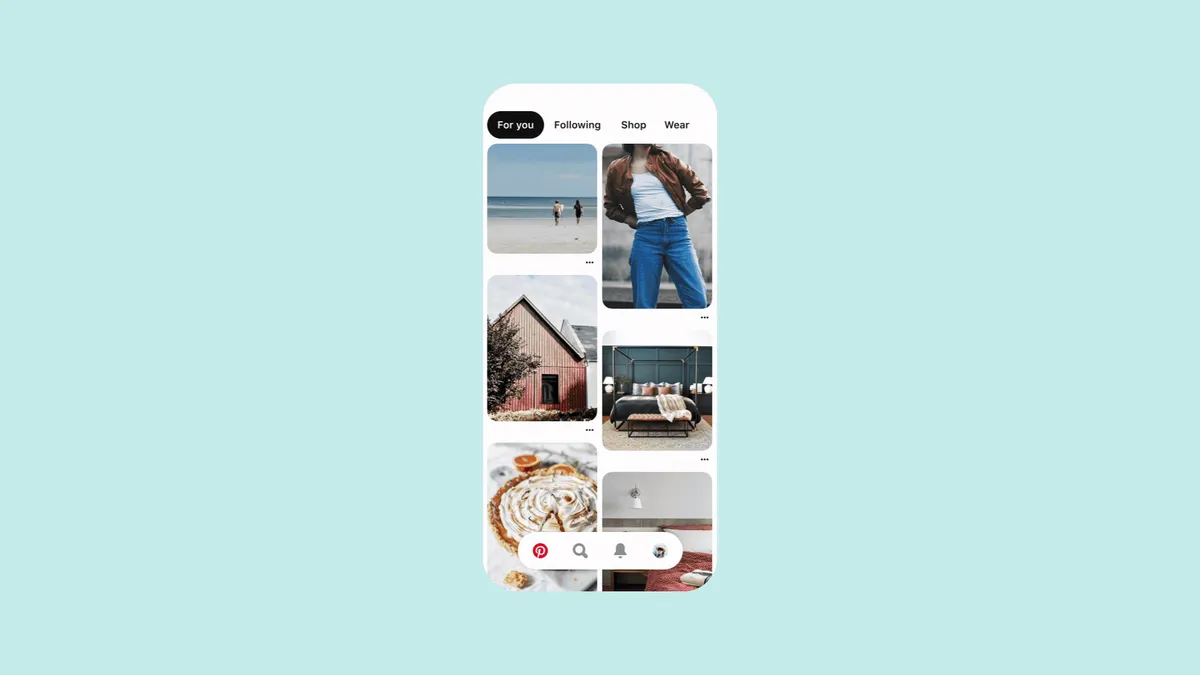Brief:
- Pinterest introduced several updates for retailers as the platform experiences a jump in searches that indicate how people are using it for ideas during the coronavirus pandemic. In the past two weeks, searches for "makeup tutorial for beginners" jumped 180%, for "kid-friendly recipes" 64%, "home organization" 43% and "spa day at home" 19%, per information shared with sister publication Mobile Marketer.
- The platform updated its "conversion insights" to help retailers see more information about its effect on website visits, checkouts and sales, and upgraded Catalogs, which turns product catalogs into shoppable posts, with time-saving features, a scheduler and measurement tools.
- Pinterest also extended its dynamic ad retargeting to global markets for marketers who want to reach users based on their engagement and search history.
Insight:
Pinterest's updates can help mobile marketers in several ways as people adjust to the significant disruptions in their daily routines during the pandemic, though research indicates that consumer spending is mostly focused on necessities amid record job losses and major economic uncertainty. Pinterest's updates include improvements to Catalogs, which it describes as a "feed-ingestion tool for businesses." In other words, Catalogs handles the mechanics of uploading a retailer's product catalog and reformatting its appearance to display on Pinterest. The company added more software tools to expedite that process and to show more engagement metrics.
Coyuchi, Filson, Lotuff Leather, Ruggable and Quay Australia are among the first retailers to participate in Pinterest's verified merchant program, first announced seven weeks ago. The program lets retailers show that they've met the social media company's standards for quality customer service after being reviewed by its staff. It displays a blue checkmark on the profile pages of approved retailers. Verified merchants are eligible to be shown more prominently in places where people tend to shop most often, such as Pinterest's "more to shop" section, a spokesperson said. They also will have greater access to conversion metrics to deepen user insights.
For smaller boutiques that might not have the same name recognition as national chains with big advertising budgets, Pinterest's authentication process can help to demonstrate that they're legitimate sellers. It also can help retailers convert people who use Pinterest to collect photos of products and services into paying customers. By the end of last year, Pinterest's global user base grew 26% to 335 million, a sizable audience of potential customers that can be targeted based on their interests and browsing histories.
For Pinterest, the expanded programs for merchants are another step in transforming its app and website into an e-commerce platform. By requiring sellers to meet certain guidelines for its verified merchant program, Pinterest can reinforce the idea that it provides a safe place to shop. That theme is consistent with last year's effort to emphasize Pinterest as a "place for inspiration" while resisting the "social network" label in preparation for an initial public offering. To prepare for the most recent holiday shopping season, Pinterest in November created the @PinterestShop account to showcase a selection of smaller merchants selling products on its platform. In January, it debuted a shoppable augmented reality (AR) try-on feature for cosmetics brands selling lipstick.
The retailer-oriented updates follow Pinterest's rollout of features aimed at consumers earlier in the week. Those features include the addition of a "Today" tab as a hub for daily inspiration, trending posts and curated topics as traffic surges to a record during the pandemic. Pinterest's editorial team and guest editors select items to feature in the tab, which appears at the top of the home feed on its iOS and Android apps. Pinterest also added "compassionate search" to its website, expanding a mental wellness feature that had been available on its app.















